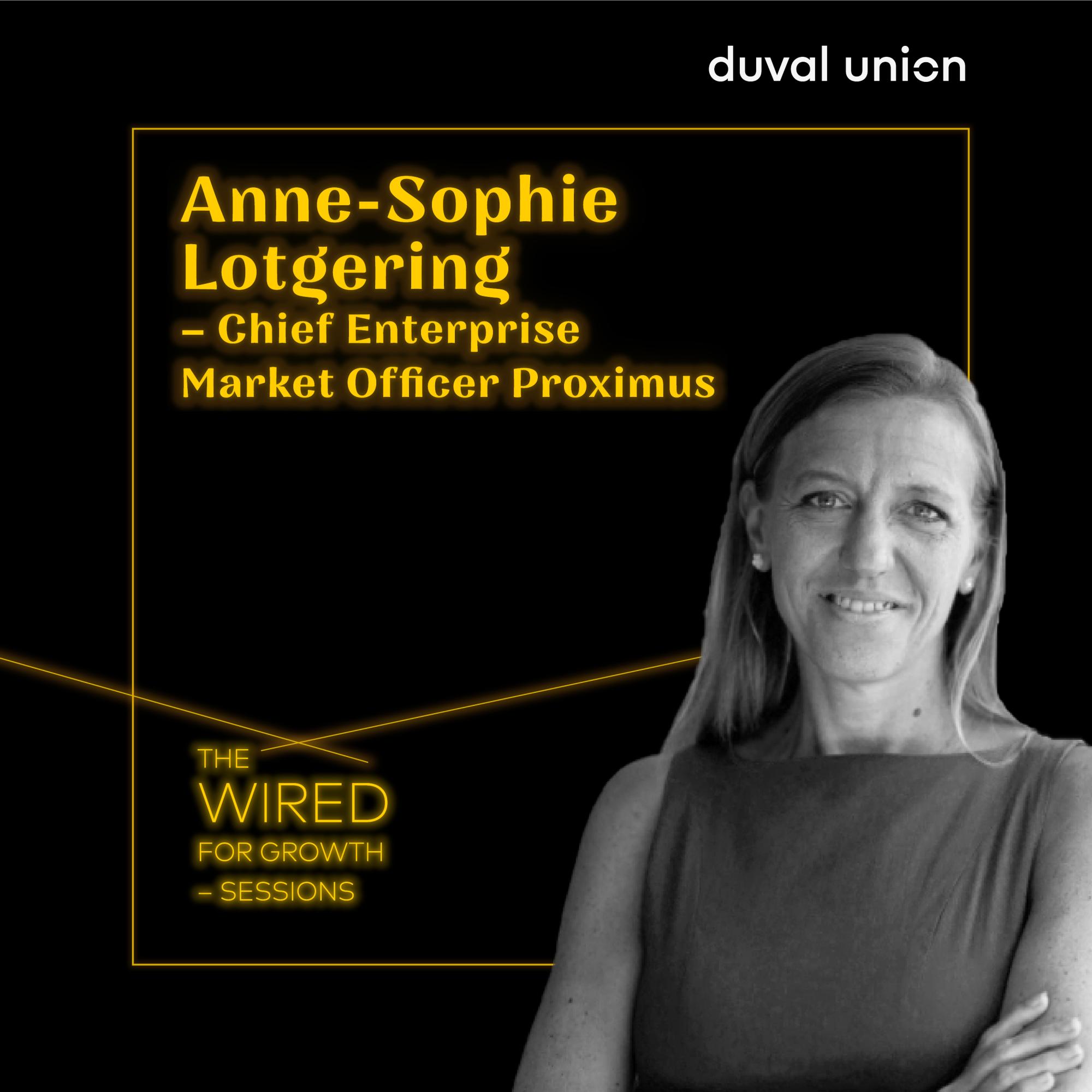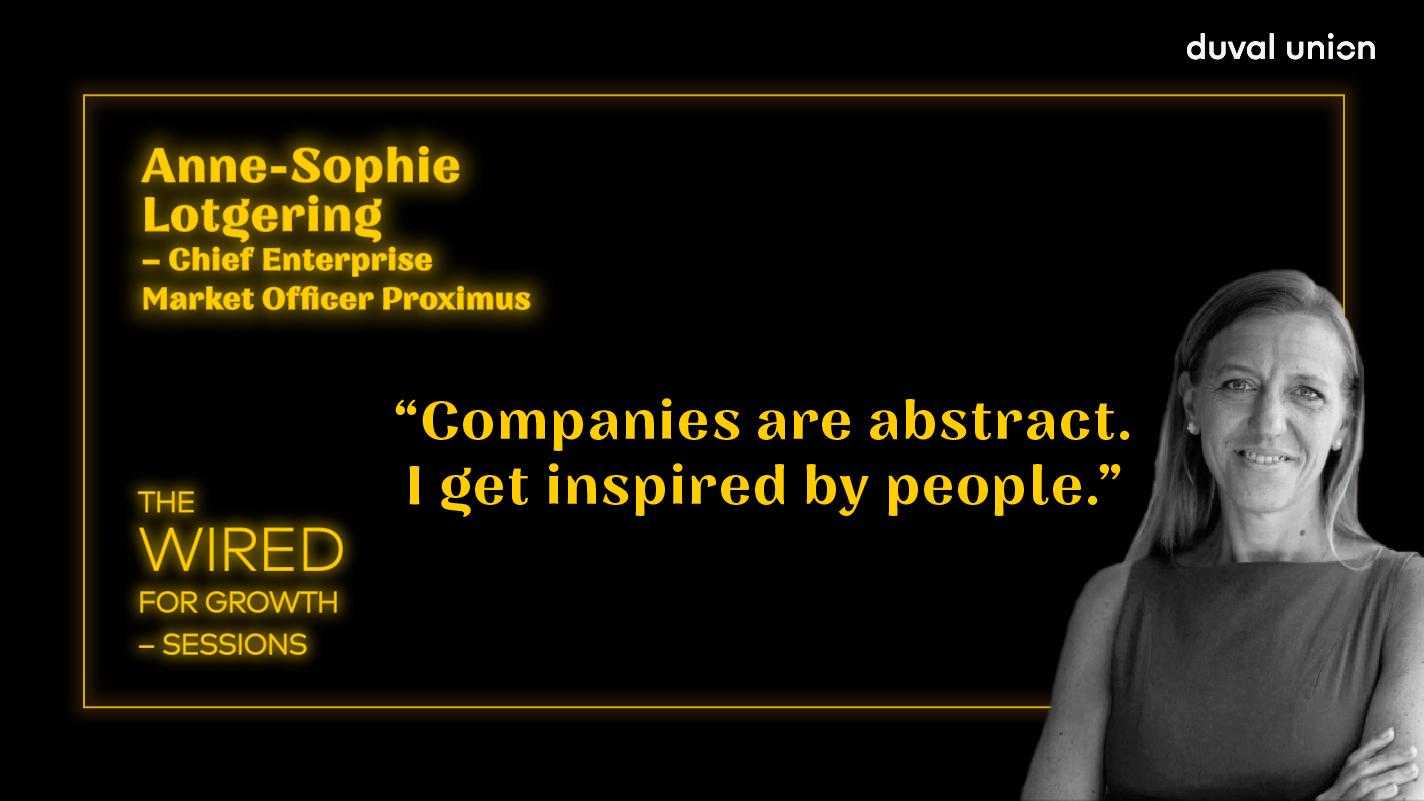How can companies thrive in this rapidly changing world? And how can co-creation help you crush your growth goals? Anne-Sophie Lotgering, Chief Enterprise Market Officer at Proximus, answers these questions in our latest podcast. According to her, telco companies might just be the missing piece in your organizations’ growth puzzle. Time for a sit-down!

It’s a far cry from years where customers used to be helped by a friendly face with some good advice. These days it’s all about tech and to be honest… it can be quite a nightmare to navigate through all these new technologies. Blockchain-what-to-who? In order to be innovative, companies need to have the necessary data, skillsets, market knowledge and don’t forget new and shiny ideas. A laundry list of things to check off before actually attaining success. But what if there is an easier way? That’s where co-creation comes into play. According to Anne-Sophie Lotgering, Chief Enterprise Market Officer at Proximus, it helps companies remain competitive.
Reinventing telco in the digital economy
The telco landscape has changed tremendously these last ten years. “When I first started working, we were still using fax and landlines,” Anne-Sophie says. “ Today people have fiber in their homes, we are able to do amazing things through connectivity.” Think of intelligent factories, smart cities or autonomous vehicles, those are all examples of connectivity that can proactively improve the efficiency of business operations. Conclusion? Telco is no longer just a commodity, but has merged with the field of IT. The industry now helps companies and organizations with reaching digital maturity.
According to Anne-Sophie today’s companies are driven by four things: They want to be cloud-enabled, because it provides them with a lot of flexibility. They need to have some kind of online presence to be able to still cater to consumers and their employees need to have the necessary skills . So, digitalization is the second key component. And don’t forget to be data-driven. One of the key changes that we have seen in the last couple of years is that companies understand the power of data. Until very recently data was lying idle. But companies today understand how powerful prescriptive data can be. So being a data-driven company is the third box to check-off. And then last but not least, it’s all about security. The biggest asset a company has is its IP and therefore it needs to be end-to-end secured. These are the four pillars to any digital transformation.
And that’s where co-creation comes in. In a nutshell: co-creation is when businesses include outsiders in the ideation and development process. So, Proximus helps create new strategic business models by using their tech know-how and by bringing the right people together.
Are ecosystems the silver bullet for growth?
And now I hear you thinking: telco companies are not at the heart of the value chain…that’s where you’re wrong. Businesses are increasingly going digital. Services that were previously too expensive are now made possible thanks to connectivity and new technologies. So, telco companies are very much at the heart of the digital value chain, with organizations across industries relying on communication networks and computing power for crucial elements of their services.
But how does such an ecosystem come about? “The most important thing is to understand the value it will deliver to the end-consumer,” says Anne-Sophie. “And what partnership or alliance will be the most relevant?” Those are important questions, especially when it comes to adjacent and breakthrough innovation. It’s the combination of different expertise and knowledge within a set of companies that will enable this breakthrough.
Bringing the right parties together
Businesses’ teaming up with partners and even competitors has been very rare in the past. So what is the secret of Proximus? According to Anne-Sophie there are different paths to ecosystem success.
It can happen through a company that wants to provide a certain service to a partnering business or to consumers. They have often already identified some start-ups or academics with who they would like to collaborate on this subject and they’re building their ecosystem of which Proximus wants to be part of.
Don’t forget to look at what’s happening in the market and tap into the start-up world as well. It’s through that type of adjacent innovation that Proximus is trying to make a difference. Their collaboration with Signpost to help schools with their digital transformation is the perfect example of this.
Finally: don’t gaze blindly at the assets of a company on paper. Take the time you need to talk to potential candidates on several occasions. After all, for successful co-creation, it is not only important for all partners to benefit from the cooperation. Things must click between them, too.
Can consumers play an active role in co-creation?
As a consumer, you – yes, you – can be actively involved and take part in the design of new services. The whole purpose of co-creating and co-ideating is not just to deliver something for someone. It’s to deliver value for your end-users and for the company. It can be an excellent way to discover new market opportunities and customers will feel like they are being listened to.
But co-creation isn’t always a walk in the park. Keep in mind that the value for the end-consumer can actually vary depending on what business outcome you want to attain. Take drones for example, they can be used in a variety of ways. They can be used to quickly deliver organs to hospitals or by the police for crowd monitoring. All thanks to mind-blowing 5G. Depending on the source of innovation that you are working with, even if it’s the same medium, the benefit for the end-user can be very different depending on the usage.
Want to take advantage of these opportunities, understand the strategies and take your business to the next level? Listen to this episode of our podcast and refer to it when needed. Find this episode on Spotify, Apple Podcast or Stitcher.



